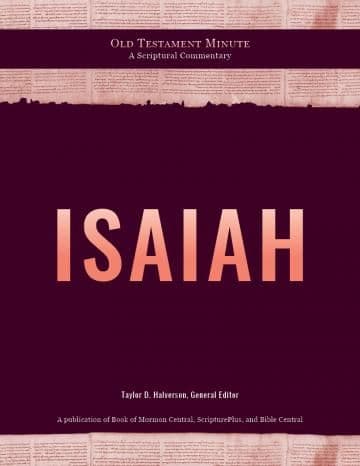Book
34 Chapters

Chapter 2 begins on a happy note as it continues describing what Isaiah saw concerning Judah and Jerusalem, this time with a latter-day temple.
2:1–3. This section is also found in Micah 4:1–3. Although Isaiah and Micah are contemporaries, it is not clear who is quoting whom. Micah has just prophesied the destruction of the present temple, so these verses describing its rebuilding must have been sublime for his hearers.
These verses are also some of the most quoted words in our day because they refer directly to a temple to be built “in the tops of the mountains,” and how the whole world will flow to it. At the time of writing, there are ninety-seven temples in the process of being built all over the world as the Salt Lake Temple is being renovated to last into the Millennium.
2:3–4. This section refers to the God of Jacob utilizing the temple to “teach us of His ways.” God’s “ways” are one image that will return later on in the book. Isaiah 55:8–9 states, “‘My ways are not your ways’, saith the Lord.” This is precisely what modern temples are built to do, to teach His ways! Writing on the outside of each modern temple boldly describe the temple’s curriculum in large stone or golden letters: “Holiness to the Lord.” This description is reminiscent of the engraved gold plate with those same words worn on the High Priest’s turban like a crown in Moses’s day.[1]
We may each “go up” to a temple to learn the Lord’s way, walking along his pathway, and how to come to heaven by following that path to our heavenly home. President Nelson calls this way “the covenant path.” Isaiah calls it “the way of holiness.”
Isaiah 35:8–10 states,
And an highway shall be there, and a way, and it shall be called the way of holiness; the unclean shall not pass over it; but it shall be for those: the wayfaring men, though fools, shall not err therein.
No lion shall be there, nor any ravenous beast shall go up thereon, it shall not be found there; but the redeemed shall walk there:And the ransomed of the Lord shall return, and come to Zion with songs and everlasting joy upon their heads: they shall obtain joy and gladness, and sorrow and sighing shall flee away.
The plea in Isaiah 2:5 is thus a heartfelt invitation.
Note that in the Joseph Smith Translation and Book of Mormon a phrase is added to Isaiah 2:5 that reads, “Yea, come, for ye have all gone astray, everyone to his wicked ways.”
This is reminiscent of Joseph Smith’s first encounter with the Father and the Son as described in Joseph Smith—History 1:19–20, when they said to him,
I was answered that I must join none of them, for they were all wrong; and the Personage who addressed me said that all their creeds were an abomination in his sight; that those professors were all corrupt; that: “they draw near to me with their lips, but their hearts are far from me, they teach for doctrines the commandments of men, having a form of godliness, but they deny the power thereof.”
He again forbade me to join with any of them; and many other things did he say unto me, which I cannot write at this time.
2:22; “Cease ye from man.” The difference between man and God is that when man breathes his last breath, he no longer can live in a mortal body, but when the world was created it was God who breathed into his (man’s) nostrils the breath of life; and man became a living soul. So trust in that power that enabled man to begin breathing, not in mere mortals who could stop breathing at any time.
The Joseph Smith Translation of Isaiah 2:10 is longer than the King James translation:
“O ye wicked ones, enter into the rock, and hide thee in the dust, for the glory of his majesty.”
The land surrounding Jerusalem is mountainous and full of caves, as described in Isaiah 2:19–21 and 2 Nephi 12:19, “And they shall go into the holes of the rocks, and into the caves of the earth.” Note 1 Nephi 3:27: “And we hid ourselves in the cavity of a rock.” The well-known ancient documents called the Dead Sea Scrolls were found hidden in caves south of Jerusalem.
Isaiah 2:13 speaks of Lebanon, which is north of Israel on the shores of the Mediterranean.
The version of Isaiah 2:20 found in the Great Isaiah Scroll, one of the Dead Sea Scrolls, reads: “[They shall cast] . . . their idols of gold, which they made with their own fingers to worship, to the moles and to the bats.
This comment refers to the usual homes of moles and bats: in darkness in caves and under the ground.
Book
34 Chapters
Items in the BMC Archive are made publicly available for non-commercial, private use. Inclusion within the BMC Archive does not imply endorsement. Items do not represent the official views of The Church of Jesus Christ of Latter-day Saints or of Book of Mormon Central.